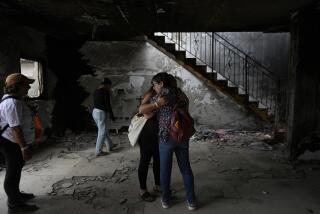Suicide Attack Kills 2 in Jerusalem
- Share via
JERUSALEM — A teenage Palestinian suicide bomber slipped through a tight net of Israeli security set up for the Jewish high holy days and blew herself up at a busy intersection here Wednesday, killing two Israeli police officers.
Prime Minister Ariel Sharon promised to strike hard at Palestinian militants in the wake of the bombing, which injured nearly two dozen people and left broken glass and bloodied scraps of flesh and clothing across a boulevard in the French Hill district.
The neighborhood, at the northern entrance to Jerusalem, has been the scene of several attacks during nearly four years of conflict.
Israel’s security establishment was rattled by the attack, because the West Bank and Gaza Strip were supposed to be virtually sealed off.
Israel closed the Palestinian territories last week before Rosh Hashanah, the Jewish New Year holiday. That closure is to remain in force through Yom Kippur, the most solemn observance of the Jewish year, which will begin at sundown Friday and last until sundown Saturday.
Sharon, who was interviewed on Israeli television moments after the midafternoon bombing, was visibly angered.
“In many cases, we prevent grievous disasters -- sometimes things happen, as they did today,” he said. “But we intend to continue our struggle against terror with all force.”
Wednesday’s attack was the second suicide bombing inside Israel in little more than three weeks. Until a dual bombing Aug. 31 in the Negev desert town of Beersheba killed 16 passengers aboard two buses, Israelis had had a six-month respite from such attacks.
For months, the prime minister and other Israeli officials had made threats against Palestinian Authority President Yasser Arafat, and Sharon had explicitly underscored those warnings in an interview hours before the latest bombing.
“We acted against Hamas leaders as well as a not-insignificant numbers of others ... in a way and a time that we deemed fit,” he told Israel Radio, referring to a campaign of “targeted killings” of Palestinian militants throughout much of the uprising.
“And when the issue of dealing with Arafat comes up, we will act in the same way again,” the Israeli leader said.
The U.S. has opposed any Israeli move to harm or expel Arafat, and Israeli officials have indicated an intent to abide by American wishes, even while keeping up the harsh rhetoric.
Palestinian officials condemned Wednesday’s bombing. But in line with usual practice, they coupled their criticism with a denunciation of Israel’s tactics in the West Bank and Gaza.
The Al Aqsa Martyrs Brigade, a Palestinian militia tied to Arafat’s Fatah movement, took responsibility for the bombing, saying it was carried out in response to Israel’s assassination last week of one of the group’s senior leaders in the northern West Bank.
Palestinian and Israeli security sources identified Wednesday’s bomber as 19-year-old Zeynab Ali abu Salem, from the Askar refugee camp on the outskirts of the West Bank city of Nablus.
In French Hill, witnesses said the Palestinian attacker was stopped at an Israeli checkpoint where pedestrians preparing to board city buses are inspected. Israeli soldiers also gather at a nearby shelter while waiting to hitch rides.
Authorities credited the police and the border police, a paramilitary force that is heavily deployed in and around Jerusalem, with preventing a far greater toll.
When the bomber detonated her 6- to 12-pound explosive device, she was either targeting officers at the checkpoint or had realized she was not going to be able to approach a more crowded area, Israeli authorities said.
The security forces “prevented a much graver attack,” said Jerusalem police commander Ilan Franco. But the resulting blast was grisly enough.
“When I arrived, I saw sights that Jerusalem has been spared in recent months: hands, legs, body parts everywhere,” said Haim Weingarten, a volunteer with the Zaka religious-burial society.
Batsheva Sobelman in The Times’ Jerusalem Bureau contributed to this report.
More to Read
Sign up for Essential California
The most important California stories and recommendations in your inbox every morning.
You may occasionally receive promotional content from the Los Angeles Times.










